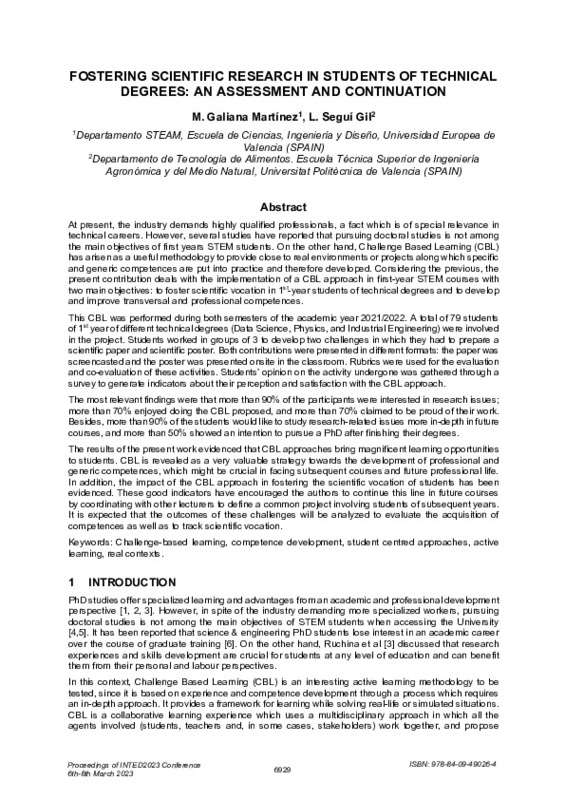|
Resumen:
|
[EN] At present, the industry demands highly qualified professionals, a fact which is of special relevance in technical careers. However, several studies have reported that pursuing doctoral studies is not among the main ...[+]
[EN] At present, the industry demands highly qualified professionals, a fact which is of special relevance in technical careers. However, several studies have reported that pursuing doctoral studies is not among the main objectives of first years STEM students. On the other hand, Challenge Based Learning (CBL)
has arisen as a useful methodology to provide close to real environments or projects along which specific and generic competences are put into practice and therefore developed. Considering the previous, the present contribution deals with the implementation of a CBL approach in first-year STEM courses with two main objectives: to foster scientific vocation in 1st-year students of technical degrees and to develop and improve transversal and professional competences.
This CBL was performed during both semesters of the academic year 2021/2022. A total of 79 students of 1st year of different technical degrees (Data Science, Physics, and Industrial Engineering) were involved in the project. Students worked in groups of 3 to develop two challenges in which they had to prepare a scientific paper and scientific poster. Both contributions were presented in different formats: the paper was screencasted and the poster was presented onsite in the classroom. Rubrics were used for the evaluation and co-evaluation of these activities. Students¿ opinion on the activity undergone was gathered through a survey to generate indicators about their perception and satisfaction with the CBL approach.
The most relevant findings were that more than 90% of the participants were interested in research issues; more than 70% enjoyed doing the CBL proposed, and more than 70% claimed to be proud of their work.
Besides, more than 90% of the students would like to study research-related issues more in-depth in future courses, and more than 50% showed an intention to pursue a PhD after finishing their degrees. The results of the present work evidenced that CBL approaches bring magnificent learning opportunities
to students. CBL is revealed as a very valuable strategy towards the development of professional and generic competences, which might be crucial in facing subsequent courses and future professional life. In addition, the impact of the CBL approach in fostering the scientific vocation of students has been evidenced. These good indicators have encouraged the authors to continue this line in future courses by coordinating with other lecturers to define a common project involving students of subsequent years. It is expected that the outcomes of these challenges will be analyzed to evaluate the acquisition of competences as well as to track scientific vocation.
[-]
|









